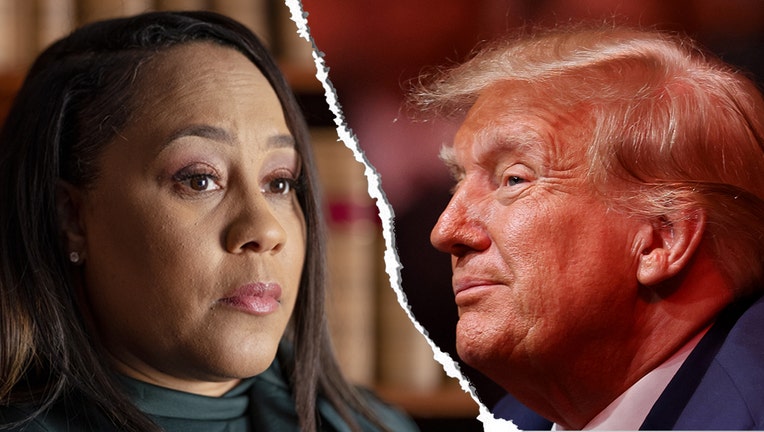DA Willis fights to dismiss Trump's appeal over disqualification

ATLANTA - Fulton County District Attorney Fani Willis has filed a motion to dismiss an appeal by former President Donald Trump and others in the Georgia election interference case.
Oral arguments are currently scheduled for October before the Georgia Court of Appeals to attempt to reverse the decision by Fulton County Superior Court Judge Scott McAfee on the motions to disqualify DA Willis from the case.
DA Willis Disqualification Ruling
After former prosecutor Nathan Wade and Willis admitted to their personal relationship but denied any wrongdoing, McAfee issued a ruling that allowed Wade to resign and Willis to remain on the case.
The former president and other defendants, dissatisfied with Judge McAfee's decision, decided to appeal to the Georgia Court of Appeals.
SEE ALSO: Georgia election interference case: Judge McAfee plans to keep working
According to the oral argument request filed earlier this week, the appeal involves a novel issue concerning "forensic misconduct" as a basis to disqualify an elected district attorney and her office. This term refers to actions by a prosecutor that might improperly influence a jury, such as expressing personal beliefs about a defendant’s guilt. The trial court applied the standard from the 1988 Williams v. State case but noted a lack of guidance on applying it, particularly regarding whether it is necessary to show prejudice and how to measure it.
Trump's appeal focuses on the necessity to disqualify DA Willis due to her extrajudicial comments, which included a speech at a historic Black church during Martin Luther King Jr. Day weekend. In this speech, Willis discussed race and her communications with God, which Trump contends could prejudice the jury and breach professional conduct rules. The trial court acknowledged the impropriety but chose not to disqualify Willis.
The appeal also contends that simplifying a complex case with multiple related appeals is essential, arguing that failure to disqualify Willis could lead to costly retrials.
Fulton County District Attorney files motion to quash appeal
Willis maintains that the appeal was improperly granted given the lack of sufficient evidence to overturn the trial court's ruling. The original order, issued on March 15, denied motions to disqualify DA Willis or to dismiss the case, citing allegations of a conflict of interest due to her relationship with Wade.
Trump and others alleged that Willis had a personal stake in the case due to financial benefits from her relationship with Wade. Nevertheless, the trial court deemed these claims unsubstantiated. In its findings, the court noted that the evidence provided by the appellants, including testimony from attorney Terrence Bradley, was not credible and failed to demonstrate any financial gain or personal interest influencing the prosecution's actions.
Invoking precedence, Willis highlighted that appellate courts should respect the trial court's factual findings unless they are clearly in error. The trial court provided the appellants with ample opportunity to present their evidence, which ultimately did not substantiate their claims of a conflict of interest.
The trial court's order also dealt with allegations of forensic misconduct related to Willis's public comments. Upon review, the court determined that these comments did not justify disqualification, as they neither prejudiced the defendants' rights nor impacted the fairness of the trial.
With no significant grounds for reversal, Willis is requesting that the Georgia Court of Appeals dismiss the interlocutory appeal. This high-stakes legal battle continues to garner significant attention as it unfolds in Georgia's appellate courts.
Steve Sadow, attorney for Trump, issued a statement following the DA's motion to dismiss the appeal:
"The State's motion to dismiss the interlocutory appeal, which the Court of Appeals had already permitted, appears to be a desperate attempt to prevent any appellate review of DA Willis' misconduct. The State's motion conveniently omits that Judge McAfee's ruling noted an 'odor of mendacity remains' following the testimony heard from the DA and the State's witnesses. The judge also voiced 'reasonable questions' regarding whether Willis and former prosecutor Wade provided untruthful testimony. The State has previously attempted this strategy without success."
SEE ALSO: Trump seeks oral argument in Georgia Court of Appeals against DA Willis
The DA’s office has not publicly commented on the filing.
Nathan Wade comments on relationship with Willis
In an interview with CNN on Wednesday, Wade discussed his ongoing relationship with Fani Willis, acknowledging that he continues to speak with her regularly and considers her a close friend. He remarked that while his relationship with Willis was not an error, it has become a distraction in the ongoing legal case.
The interview was at one point interrupted by an associate of Wade when he was asked about the timeline of his romantic relationship with Willis. He ended up refusing to answer, citing the pending appeal.
Oral arguments are scheduled for October 4. The court will then have until mid-March to issue a decision, and the losing party will have the option to appeal to the Georgia Supreme Court.
The court has ordered a stay on the election interference case until this matter can be resolved.
In August 2023, a Fulton County grand jury indicted Trump and 18 others, accusing them of engaging in an extensive scheme to illegally try to overturn the 2020 presidential election in Georgia. Four defendants have entered guilty pleas after striking deals with prosecutors, but Trump and the rest have pleaded not guilty.
Last month, Trump was convicted in New York City of falsifying records to conceal a sex scandal. He is scheduled for sentencing on July 11.

